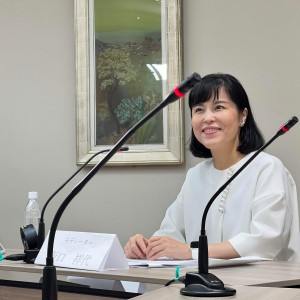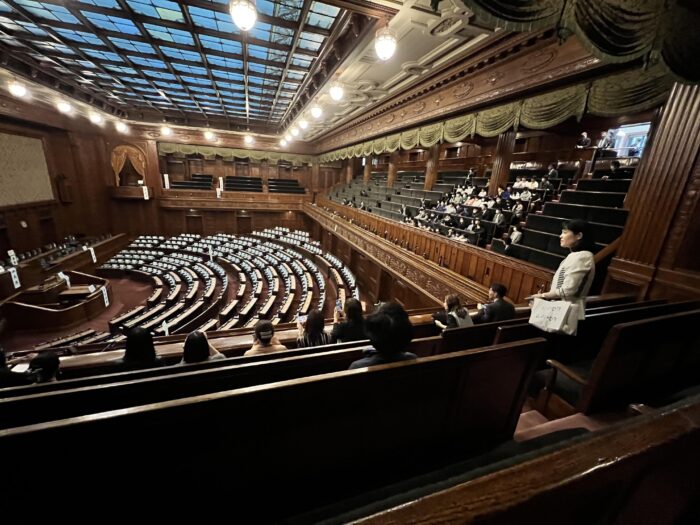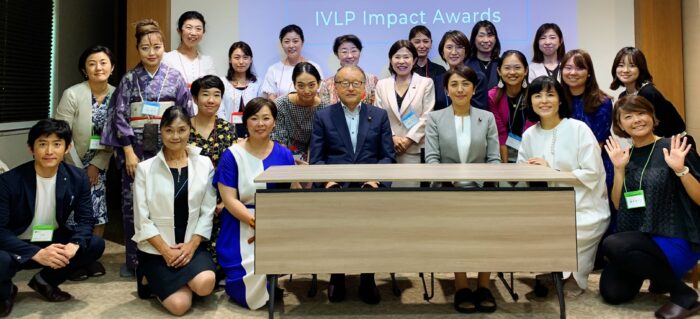
Sachiyo at a workshop on gender equity in politics. All photos from Meridian International Center.
Sachiyo Sakaguchi is a policy secretary in Japan’s House of Representatives and 2022 alumna of the International Visitor Leadership Program (IVLP). She received an Honorable Mention for the Global Ties U.S. 2024 IVLP Award for Social Innovation and Change and a 2023 IVLP Impact Award for her project, Empowering Women Candidates for Local & National Government Elections in Japan, to encourage women and girls to be active leaders in politics. We spoke with Sachiyo about civic engagement, mentorship, and how empowering the next generation can foster positive changes for women in Japan.
Sachiyo’s 2022 IVLP, “Empowering Women’s Political Leadership,” was programmed by IIE (Washington, DC) in coordination with World Affairs Council of New Hampshire (Manchester, NH), WorldOregon (Portland, OR), and GlobalAustin (Austin, TX). Her 2023 IVLP Impact Award was managed by Meridian International Center.
Civic engagement and community development are at the heart of your work. Why are you so passionate about this work? What drives you?
Civic engagement and community development are values deeply rooted in my upbringing. I grew up in the rural area of Wakayama Prefecture, and my great-grandfather dedicated himself to his duties as the village mayor in a village in the southern part of the prefecture. From a young age, I have felt the strength and warmth of my local community. I believe that if the community thrives, it will contribute to the overall wellbeing of Japan. I believe in the power of individuals coming together to bring about positive changes in the community. Despite Japan facing a significant population decline, the efforts that are being made currently give me hope that even people 100 years from now will see happiness and prosperity in their communities. This belief fuels my passion for this work.
Even before your 2022 IVLP you co-launched Maggie’s Tokyo, an NGO to support families with cancer. Can you tell us about your role in that organization?
Maggie’s Tokyo is the second international branch of the UK-born “Maggie’s Cancer Caring Centres.” It provides a place where anyone affected by cancer—including those who have experienced it, their families, and friends—can visit when they feel lost and alone, find a safe space to talk, and receive support to regain their strength. I have served as a part-time fundraiser since its establishment, taking on various roles such as fundraising, planning and managing events, and coordinating volunteers.
What was it about your IVLP that inspired you to implement an IVLP Impact Award project? Tell us a little more about your project and what’s next?
Participating in the IVLP made me acutely aware of the importance of strengthening women’s political leadership. Women’s political participation in Japan is still lagging, and through my IVLP Impact Award project: Empowering Women Candidates for Local & National Government Elections in Japan, I aimed to support female candidates and promote diversity in politics. With the grant I received, my team members conducted four workshops attended by around 200 individuals interested in politics. Some participants decided to learn more about politics by becoming political secretaries, while others are preparing for local elections to become council members.

Sachiyo leads participants on a guided tour of the National Diet Building.
I want to see more women participating in politics and holding influential positions, which will help create a fairer and more inclusive society. At the end of September this year, with the cooperation of JAC-US (Japan Alumni Community of U.S. exchange programs), we plan to host an event focused on women’s empowerment, featuring female politicians and entrepreneurs as speakers.
You mentor girls through the Girls Unlimited Program. Can you give us some details about that initiative? Why is mentorship important to you?
The Girls Unlimited Program (GUP) helps junior and senior high school girls, who are at a sensitive stage of their lives, meet adults with a global perspective different from that of their parents and teachers, as well as peers who share similar concerns and goals. By building mutually supportive relationships, this program fosters independence, and helps participants gather the courage to take the first step in overcoming life’s turning points.
As a mentor, I support the girls’ growth and assist them in realizing their dreams. I believe mentorship is a crucial means for the younger generation to maximize their potential. Through dialogue, we aim to help them develop the ability to ask questions and learn about life and diversity. I find great significance in contributing to this process.
What changes do you think could result from empowering girls and women, and specifically having more involvement of women, in politics in Japan?
Women’s political participation in Japan is lagging, especially compared to other countries in Asia. Over the past 60 years, the proportion of female members in Japan’s House of Representatives has remained stagnant. I believe that promoting gender equality education from middle and high school onwards will lead to an increase in women’s political participation and bring about many changes in society. Firstly, incorporating diverse perspectives into the decision-making process will make it easier to develop more inclusive and equitable policies. I also believe that by reflecting women’s perspectives, there will be a better understanding and response to issues that have not been adequately addressed, especially those affecting women, children, and the elderly.
Additionally, seeing women actively participating in politics will serve as a significant encouragement for the next generation of girls. They will gain confidence in their ability to take on leadership roles, potentially leading to an increase in female leaders in the future and progress toward gender equality.

Group photo after the first workshop focusing on new leadership.
Moreover, increased political participation by women can lead to a reevaluation of gender roles in the workplace and at home, ultimately improving their working conditions and the quality of their family life. Overall, I believe that women’s empowerment, as emphasized in the WPS (Women, Peace, and Security) agenda, is a crucial factor in contributing to the development and harmony of society.
Tell us about your role as a core member of the Japanese Alumni Community. What plans does the JAC have for its members for future activities?
As a core member of JAC-US (Japan Alumni Community of U.S. exchange programs), I actively participate in networking and project planning for my fellow alumni. The community’s current initiatives seek to enhance collaboration among alumni and develop projects that have a positive impact on society. Additionally, we aim to strengthen our platform for sharing knowledge and experiences among members and supporting each other’s activities. In the coming year, we plan to host four events to address a variety of issues such as cancer support in the workplace, women’s empowerment, and encourage participation in the Osaka Expo, while also facilitating networking opportunities for our alumni.
